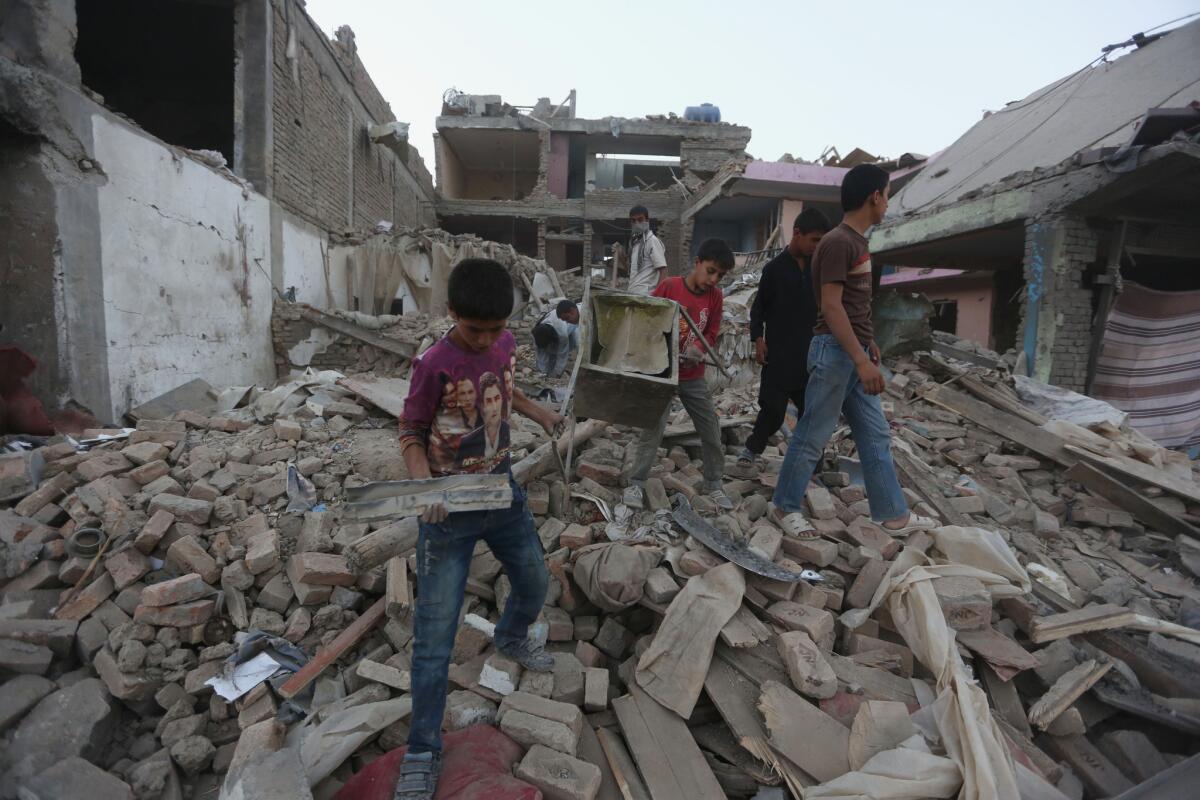At least 48 dead: Kabul’s deadliest day since 2011

Afghan boys scavenge in the rubble of their homes, which were destroyed by a truck bombing Monday in Kabul, Afghanistan.
- Share via
Reporting from Kabul, Afghanistan — A trio of attacks Friday across the Afghan capital left at least 48 people dead, more than 300 injured, myriad businesses shuttered and people’s nerves shattered.
It was the deadliest day in Kabul since 2011, with the highest number of civilians killed and injured since the United Nations Assistance Mission in Afghanistan began systematically recording civilian casualties here in 2009.
“Those responsible for suicide and complex attacks in civilian-populated areas can no longer shrug off the disproportionate harm to the civilian population they cause,” said Nicholas Haysom, the secretary-general’s special representative for Afghanistan.
“The Afghan people are resilient, but the suffering caused by these tactics in terms of civilian deaths, injuries and the loss of family members is extreme, irreversible and unjustifiable in any terms.”
The third attack occurred late Friday when Taliban fighters tried to storm a U.S. special forces base, detonating a car bomb and other blasts, followed by a firefight that lasted more than two hours.
Nine people were killed in the violence, in the Qasaba neighborhood, eight of them civilians working for international coalition forces. The other was a U.S. military service member, according to officials.
The Taliban also claimed responsibility for an evening attack in which a suicide bomber, dressed in a police uniform, detonated explosives near the gates of a police training academy. An Interior Ministry spokesman said that at least 24 people were believed dead and nearly 20 were wounded, including police and civilians.
The two attacks constituted the first Taliban-claimed incidents in Afghanistan after an announcement late last month that Mullah Mohammed Omar, the group’s founder and longtime leader, had died in 2013.
The July 29 announcement, confirmed by the Kabul government, led to the abrupt postponement of a meeting between representatives of the government of Ashraf Ghani, the Afghan president, and a Taliban delegation. The talks were aimed at moving forward with peace talks.
The first attack Friday, in which at least 15 civilians were killed and nearly 300 wounded, according to Afghan officials, involved a truck laden with explosives that was detonated near an outpost of the Afghan national security forces in the east Kabul neighborhood of Shah Shahid.
The explosives were set off near a busy road, home to hundreds of houses and shops. Dozens of businesses lay in ruins after the explosion, for which no group immediately claimed responsibility.
Friday’s attacks resulted in the highest civilian death toll in Kabul since at least 70 died in December 2011 violence on the Muslim holy day of Ashura.
Latifi is a special correspondent. Times staff writer W.J. Hennigan in Washington contributed to this report.
More to Read
Sign up for Essential California
The most important California stories and recommendations in your inbox every morning.
You may occasionally receive promotional content from the Los Angeles Times.













